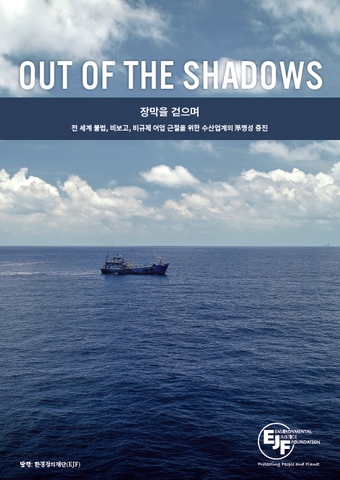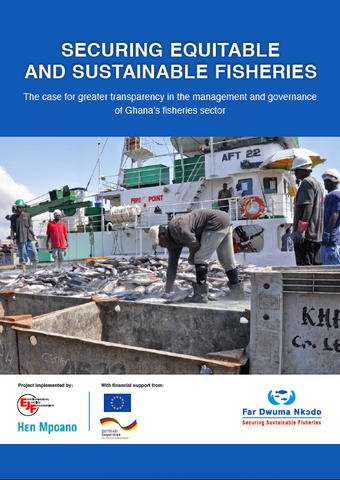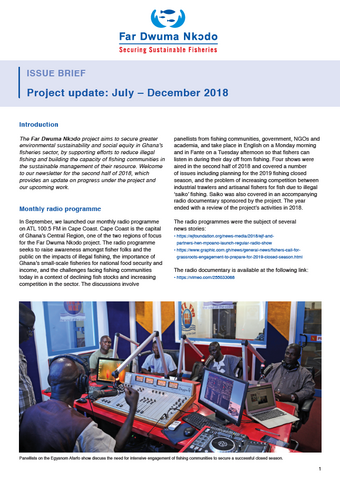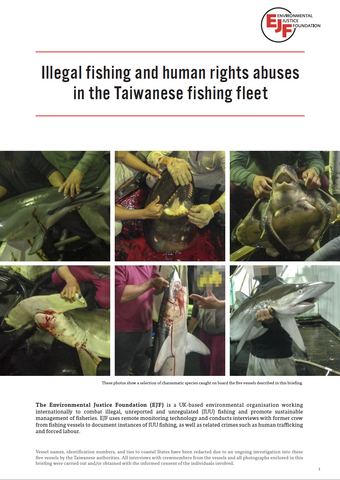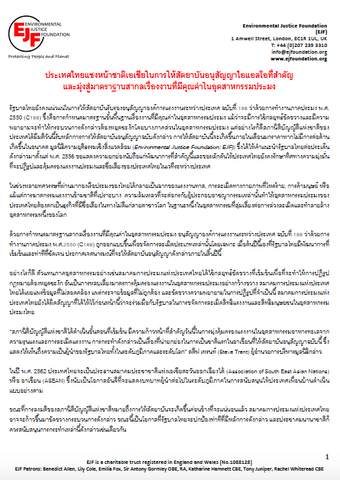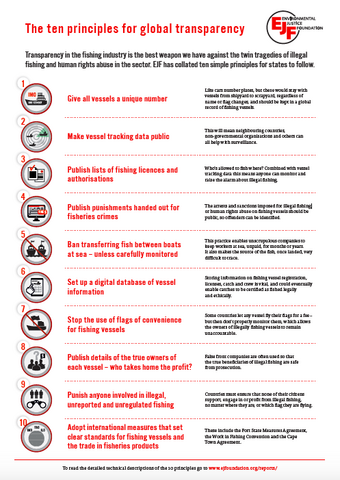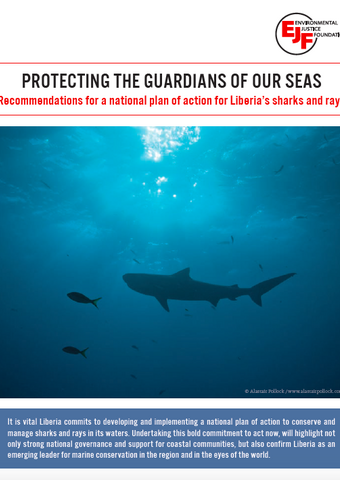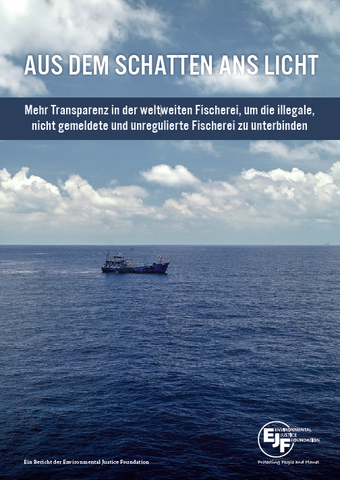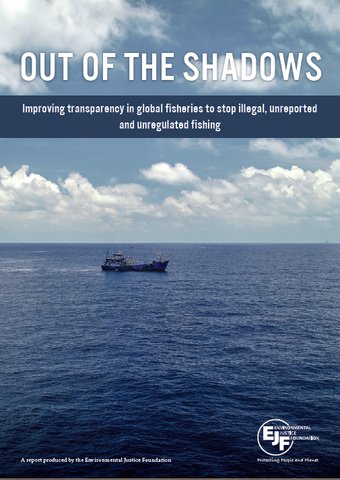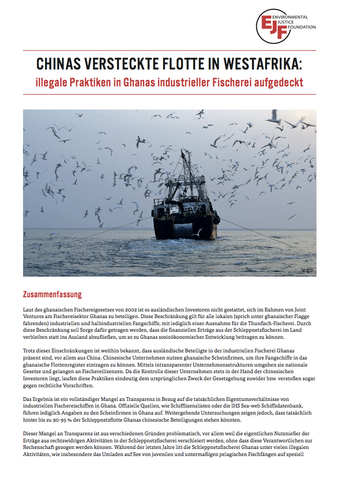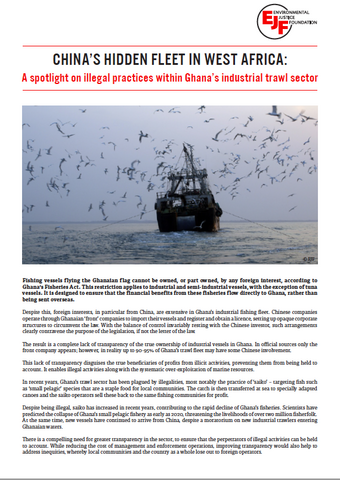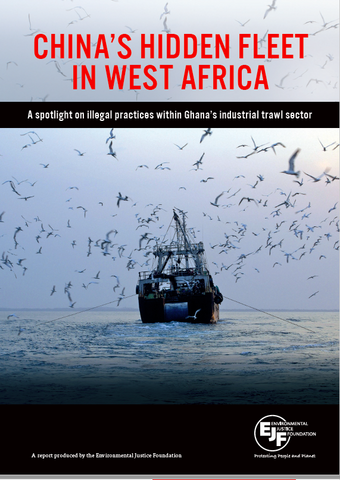Out of the shadows: Korean Version: This report lays out the ‘ten principles for global transparency in the fishing industry’. These simple, low-cost measures – which include publishing license lists and giving vessels unique numbers – are well within the reach of any country and can play a pivotal role in the battle against illegal fishing and human rights abuse in the sector.
Securing equitable and sustainable fisheries: The case for greater transparency in the management and governance of Ghana’s fisheries sector: Transparency must be improved to eradicate illegal fishing and prevent the collapse of Ghana’s fishing industry, says this new report from the Far Dwuma Nkɔdo project, which lays out key measures that can be implemented immediately by the government.
Far Dwuma Nkodo project update: July – December 2018: The Far Dwuma Nkɔdo project is implemented by EJF and Hen Mpoano, with funding from the EU. The project aims to secure greater environmental sustainability and social equity in Ghana’s fisheries sector, by supporting efforts to reduce illegal fishing and building the capacity of fishing communities in the sustainable management of their resource.
Illegal fishing and human rights abuses in the Taiwanese fishing fleet: This briefing details the EJF investigation which uncovered shockingly cruel and illegal practices on Taiwan-linked fishing vessels, including harpooning dolphins, finning and discarding tens of thousands of sharks, and catching vulnerable species of sea turtles and hammerheads. Nor were the vessels free of the human rights abuses previous EJF investigations have revealed in the fleet.
Protecting the guardians of our seas: Recommendations for a national plan of action for Liberia’s sharks and rays: Loss of sharks can lead to dramatic imbalances in marine ecosystems. This is particularly significant in Liberia, where 33,000 people rely on the fishing industry for their livelihoods, and 65% of all animal protein eaten comes from seafood.
Aus dem Schatten ans Licht: Mehr Transparenz in der weltweiten Fischerei, um die illegale, nicht gemeldete und unregulierte Fischerei zu unterbinden: Unser Bericht listet einfache und kosteneffektive Maßnahmen, die von jedem Land leicht umzusetzen sind und eine zentrale Rolle im Kampf gegen illegale Fischerei und Menschenrechtsverletzungen in der Fischereiindustrie spielen können.
Out of the shadows: Improving transparency in global fisheries to stop illegal, unreported and unregulated fishing: This report lays out the ‘ten principles for global transparency in the fishing industry’. These simple, low-cost measures – which include publishing license lists and giving vessels unique numbers – are well within the reach of any country and can play a pivotal role in the battle against illegal fishing and human rights abuse in the sector.
Chinas versteckte Flotte in Westafrika: Illegale Praktiken in Ghanas industrieller Fischerei: Die industrielle Fischereiflotte Ghanas ist durch chinesische Eigentümerstrukturen geprägt. Da die Fischerei in Ghana stark unter der illegalen Fischerei leidet, müssen die ghanaische und die chinesische Regierung zusammenarbeiten für legale und nachhaltige Fischereiaktivitäten.
Briefing: China’s hidden fleet in West Africa - a spotlight on illegal practices within Ghana’s industrial trawl sector: Around 90% of Ghana’s industrial fishing fleet is linked to Chinese ownership, despite the fact that Ghana’s laws clearly forbid any foreign ownership or control of vessels flying its flag. The Chinese and Ghanaian governments must now work together to eradicate the illegal fishing practices.
China’s hidden fleet in West Africa: a spotlight on illegal practices within Ghana’s industrial trawl sector: Around 90% of Ghana’s industrial fishing fleet is linked to Chinese ownership, despite the fact that Ghana’s laws clearly forbid any foreign ownership or control of vessels flying its flag. The Chinese and Ghanaian governments must now work together to eradicate the illegal fishing practices.
